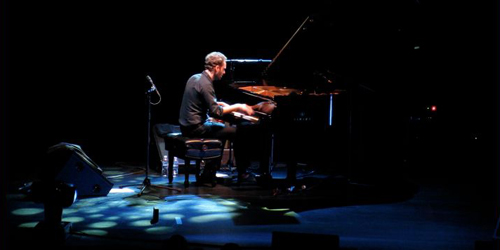
Talk about the moment when you discovered that you had synesthesia. How has this condition affected your composition?
I always had this condition, but never really understood it or knew there was so much information about it until I started to study painters with this same condition. It really opened up a whole new world that connected painting and music, sound and color. I really started to read a lot about this connection when I was asked to perform at the Guggenheim in NY for their 50th anniversary, it was also the opening of the Kandinsky exhibition at the same time. Walking through this retrospective it was incredible how musical these paintings were, and how his series of "compositions", which he felt were his musical interpretations, how they really FEEL orchestral.
In my own compositions it helped me to have more freedom expressing these ideas and perhaps also help me get ideas across to other musicians that I work with. It's a language I understand, and I suppose since I am not formally trained it gave me some grounding in what I believe is a really important part of music and composing.
Describe your process of composing solo piano pieces. Do you improvise by the piano for hours? Does a single melody simply come out of nowhere?
I think all pieces start from improvising, and slowly start to take form over time. I do like to get them to a place where there is an idea and structure… sometimes that can change at the last-minute in the recording process. But I like the idea of every note being important, and no note is treated as a throw away… I want them all to count and mean something to the piece. I guess that's also why I work in a minimal way... I think a lot of music has unnecessary notes that just seem to be there for the sake of making a piece more ornamental. I am interested in the core of what makes music work.
From your earlier solo works, I can hear a lot of classical influences in your sound. Who are your favorite classical composers and why?
Yeah I spent a lot of time listening to the classical composers, and of course it's found its way into my work. I love this deep sense of composition which I think really was unique to that time... no film, tv, radio, or all these external distractions we have now. Does anyone have years to develop a single piece of music anymore in this world where everything must happen so fast?
As for composers I love: Gavin Bryars, Chopin, Bach, John Cage, Steve Riech, Arvo Part, Morton Feldman, Stravinsky, Debussy, Erik Satie, Philip Glass to name a few...
Did you like studying the piano when you were a kid? Were the lessons something you looked forward to, or did it feel like a chore? What were the other kids doing in your neighborhood while you practiced for hours? And finally (I know this is a loaded question), how do you think this has affected your childhood, and inevitably your adult life?
An interesting question... I didn't really have serious piano studies, so it was really my choice to learn. Just simple lessons from our church organist, no conservatory or anything. I really loved to play... of course there were times when I didn't want to practice... I just wanted to be able to play instantly, and of course you have to put the time in. Most of time I was pretty happy to... but yeah, your friends are going out to play and I would stay in, that's always hard when you're a kid. But it was not a really rigid schedule I had, and perhaps now I wish I had so that I could have had a better training when I was young, as I am catching up to a lot of lost time now.
I had a long period where I didn't play piano as I was moving around a lot in my teenage years, and it was not until later when I started to get into playing guitar and playing in a band that I came back to it. Now in my adult life I am trying to learn all the things I wished I had done when I was younger, but I guess the positive thing about that is I really want to, and its a pleasure to stay in play.
[ - s n i p - ]
Read the entire interview on Headphone Commute
- – – – – – – – – – – – – – – – – – – – – – – – – – – – – – – – – – – – – – –
Read Headphone Commute's review of Lumiere
dustinohalloran.com
Sunday, May 8, 2011
Interview with Dustin O'Halloran
Subscribe to:
Post Comments (Atom)


No comments:
Post a Comment